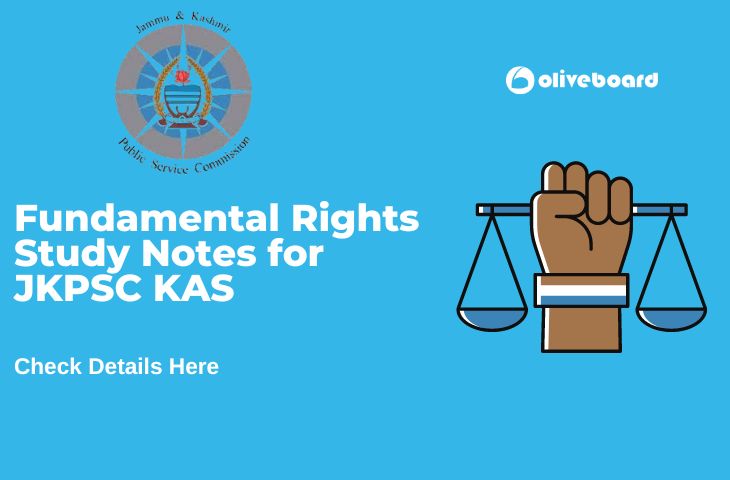Fundamental Rights Study Notes: Fundamental right is regarded as one of the most important topics of Polity in the JKPSC KAS Syllabus. In this blog, we will be discussing fundamental rights in detail.
Crack JKPSC KAS with a Free Mock Test Here
What are Fundamental Rights?
Fundamental Rights are basic human rights that are guaranteed to all the citizens of India. It comes under Part-III of the Indian constitution or Magna Carta of the Indian Constitution. These rights are covered under articles 12-35 of the Constitution of India. Originally, there were 7 Fundamental Rights in the constitution, but one right namely, the Right to property (Article 31) was removed from the list of Fundamental Rights.
The Right to property was removed by the 44th Constitutional Amendment Act, 1978, and was converted into a legal right under Article 300A in Part XII of the constitution.
Download Fundamental Rights Notes for JKPSC KAS Here
Why are they called Fundamental Rights?
Fundamental rights are known as fundamental rights due to the following reasons:
a. These rights are incorporated in the Indian constitution which guarantees their applicability.
b. These rights are justiciable i.e enforceable by courts. In simple words, a person can approach the courts of law, in the event of a violation of these rights.
Let us have a look at the fundamental rights in India in the following lines
Crack JKPSC KAS with a Free Mock Test Here
Fundamental Rights in India (From Article 12-35)
At present, there are 6 Fundamental Rights in India as approved by the Constitution of India which are as follows:
- Right to Equality
- Right to Freedom
- Right against Exploitation
- Right to Freedom of Religion
- Cultural and Educational Rights
- Right to Constitutional Remedies
We will be learning about each of these articles in detail
Download Fundamental Rights Notes for JKPSC KAS Here
Right to Equality
The Right to Equality is the first right that is present in the Constitution of India. It is covered under articles 14-18. It guarantees equal rights for everyone, irrespective of the cast, creed and religion, gender or place of birth.
This right also provides equal employment opportunities in the government sector as well as insures the citizens against discrimination by the State in matters of employment on grounds of caste and religion.
This right also includes important provisions such as the removal of titles and untouchability.
Right to Freedom
Right to Freedom is the second right on the list and it deals with the various freedoms that are provided to the people of India. These rights are included under Article 19-22 of the Indian Constitution. The following are the freedoms that are included in the fundamental rights
- Freedom of speech
- Freedom of expression
- Freedom of assembly without arms
- Freedom of association
- Freedom to practise any profession
- Freedom to reside in any part of the country
Download Fundamental Rights Notes for JKPSC KAS Here
Some of these rights are not applicable all the time, which means that under certain conditions the State has the right to impose restrictions on them. The conditions can be related to state security, public morality, decency and friendly relations with neighbouring or foreign countries.
Right Against Exploitation
This is the third set of rights that is known as the Right Against Exploitation. It is covered under Articles 23-24 and deals with the prohibition of human trafficking and forced human labour.
This right prohibits the employment of child labour in factories and also the employment of children below the age of 14 years in work involving hazardous conditions.
Crack JKPSC KAS with a Free Mock Test Here
Right to Freedom of Religion
The fourth set of fundamental rights is known as the Right to Freedom of Religion and it deals with the right to practice any faith without obstruction. It also provides the provision for establishing and maintaining religious and charitable institutions.
The right states that State has no official religion and everyone has the freedom of conscience, profession, practice and propagation of religion.
Download Fundamental Rights Notes for JKPSC KAS Here
Cultural & Educational Rights
This is the fifth in the list of fundamental rights provided in the Indian Constitution and is also known as Cultural & Educational Rights. It is covered under Articles 29-30.
This right enables the protection of rights of religious, cultural and linguistic minorities by allowing the preservation of culture and heritage.
There is also the provision of establishing and administering educational institutions by minorities in order to preserve their culture and heritage.
Crack JKPSC KAS with a Free Mock Test Here
Right to Constitutional Remedies
This is the sixth and last among the fundamental rights presently recognised by the Constitution of India. These rights deal with protecting the rights of a citizen in situations where there is a violation of fundamental rights. These rights are covered under Articles 32-35.
Under these rights, a citizen can directly approach Supreme Court in case there is any violation of the fundamental rights approved by the Indian Constitution. Also, it states that the government cannot curb or infringe upon anyone’s rights.
Download Fundamental Rights Notes for JKPSC KAS Here
Conclusion
That was all about the Fundamental Rights, we hope that it will prove beneficial for the candidates appearing for the JKPSC KAS exam. For more such articles, exam updates and mock tests, stay connected to Oliveboard.

Hello there! I’m a dedicated Government Job aspirant turned passionate writer & content marketer. My blogs are a one-stop destination for accurate and comprehensive information on exams like Regulatory Bodies, Banking, SSC, State PSCs, and more. I’m on a mission to provide you with all the details you need, conveniently in one place. When I’m not writing and marketing, you’ll find me happily experimenting in the kitchen, cooking up delightful treats. Join me on this journey of knowledge and flavors!
